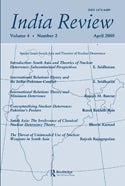Party Nominations for Elections
This is a project on how parties internally negotiate and decide on nominations for elections is being undertaken by intensive interviews with key players in both major and other parties in the 2009 elections, and extended backward as far as possible using available data, for five major political parties. This again is an unresearched subject since the early work on Indian political science in the 1960s and 1970s.


 This project seeks to do long-range research on conflict resolution and cooperation building in South Asia by applying international relations theory literature to the region and by supporting scholars from the countries of the region to do fieldwork and write research papers on different aspects of regional conflict and cooperation. The project has resulted in three volumes, E.
This project seeks to do long-range research on conflict resolution and cooperation building in South Asia by applying international relations theory literature to the region and by supporting scholars from the countries of the region to do fieldwork and write research papers on different aspects of regional conflict and cooperation. The project has resulted in three volumes, E.